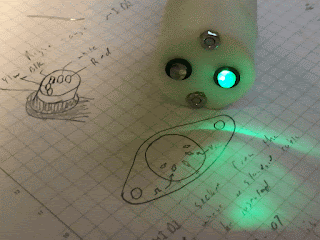I struggled with making sure my MIDI ports were wired correctly to the point that I planned to add an activity light to each panel. Indicators are still not a bad idea, but I will make a portable MIDI tester for now. Since MIDI transmitters send enough power to turn on an LED, I designed a socket with a couple of holes for two lights. One will be green and the other red, so a broadcasting device will show a flickering green light when appropriately connected and red if the wires are reversed. I adapted the model from my MIDI↔TRS experiment since it worked well last time. I wanted to install a single three-color LED from my stock, but it wasn't built for polarity detection, so I opted for two single-color lights instead. I could have added a couple of diodes to make it work, but it wasn't worth the trouble.
I added 220Ω resistors to a couple of LEDs while the print cured. Since I was copying an earlier MIDI adapter, I matched the component leads with the length of the plastic case. Of course, I made them a bit longer to seat the lights before sealing up the two halves. I put heat-shrink tubing on all the wires and right over the resistors, but it was clear, so the color code was still visible. I attached my wires to the MIDI port, triple-checking the polarity, and put a tube over each of those pins. It assembled well, and I tested the port on my timing panel, which I already knew was good. The next time I wire a MIDI port, I'll connect the leads backward and confirm that the red LED works.
The rest of the posts for this project have been arranged by date.
First time here?
Completed projects from year 1
Completed projects from year 2
Completed projects from year 3
Completed projects from year 4
Completed projects from year 5
Completed projects from year 6
Completed projects from year 7
Completed projects from year 8
Disclaimer for http://24hourengineer.blogspot.com and 24HourEngineer.com
This disclaimer must be intact and whole. This disclaimer must be included if a project is distributed.
All information on this blog, or linked by this blog, is not to be taken as advice or solicitation. Anyone attempting to replicate, in whole or in part, is responsible for the outcome and procedure. Any loss of functionality, money, property, or similar, is the responsibility of those involved in the replication.
All digital communication regarding the email address 24hourengineer@gmail.com becomes the intellectual property of Brian McEvoy. Any information contained within these messages may be distributed or retained at the discretion of Brian McEvoy. Any email sent to this address, or any email account owned by Brian McEvoy, cannot be used to claim property or assets.
Comments to the blog may be utilized or erased at the discretion of the owner. No one posting may claim property or assets based on their post.
This blog, including pictures and text, is copyright to Brian McEvoy.
2021-12-08
I added 220Ω resistors to a couple of LEDs while the print cured. Since I was copying an earlier MIDI adapter, I matched the component leads with the length of the plastic case. Of course, I made them a bit longer to seat the lights before sealing up the two halves. I put heat-shrink tubing on all the wires and right over the resistors, but it was clear, so the color code was still visible. I attached my wires to the MIDI port, triple-checking the polarity, and put a tube over each of those pins. It assembled well, and I tested the port on my timing panel, which I already knew was good. The next time I wire a MIDI port, I'll connect the leads backward and confirm that the red LED works.
This known-good port tested green
The rest of the posts for this project have been arranged by date.
First time here?
Completed projects from year 1
Completed projects from year 2
Completed projects from year 3
Completed projects from year 4
Completed projects from year 5
Completed projects from year 6
Completed projects from year 7
Completed projects from year 8
Disclaimer for http://24hourengineer.blogspot.com and 24HourEngineer.com
This disclaimer must be intact and whole. This disclaimer must be included if a project is distributed.
All information on this blog, or linked by this blog, is not to be taken as advice or solicitation. Anyone attempting to replicate, in whole or in part, is responsible for the outcome and procedure. Any loss of functionality, money, property, or similar, is the responsibility of those involved in the replication.
All digital communication regarding the email address 24hourengineer@gmail.com becomes the intellectual property of Brian McEvoy. Any information contained within these messages may be distributed or retained at the discretion of Brian McEvoy. Any email sent to this address, or any email account owned by Brian McEvoy, cannot be used to claim property or assets.
Comments to the blog may be utilized or erased at the discretion of the owner. No one posting may claim property or assets based on their post.
This blog, including pictures and text, is copyright to Brian McEvoy.
2021-12-08


Comments
Post a Comment